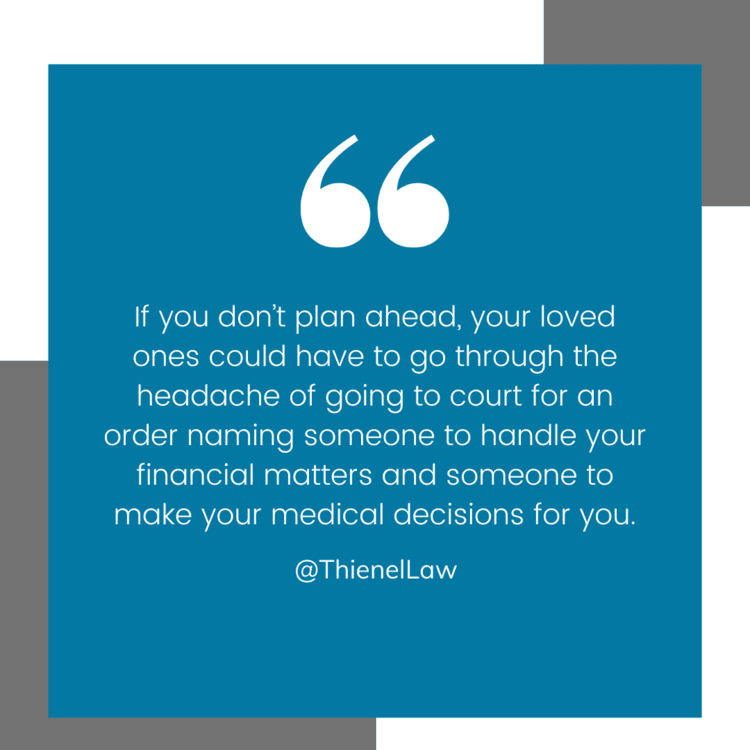12 Headaches Your Loved Ones May Face with Improper Estate Planning
When people think about what they want to leave behind to their family and friends, they might not know how a well-intentioned gift could cause problems. Just as troublesome to your survivors is a situation in which you die without valid estate planning documents.
Let's discuss the 12 headaches your loved ones may face with improper estate planning. A Maryland estate planning attorney could help prepare your documents so you avoid these common estate planning mistakes.
Is It Really a Big Deal if I Don’t Make a Will or Living Trust?
Yes.
One of the worst mistakes a person can make is to die intestate. If you die without a valid will or living trust, you are intestate. The consequences of intestacy are these:
Your estate must go through the probate courts before anything gets distributed to your loved ones.
It will be more expensive to administer your estate if you die intestate than if you had a will or living trust.
Not only will be there be less money to distribute to your loved ones because of the higher administration costs of intestacy, but it also takes longer to administer these estates, so your loved ones must wait longer to get the assets.
When you do not make estate planning documents that say who gets your assets, the law will have to distribute your assets according to your state's formula. This formula might not be the way you would have wanted to distribute your money and property. Some people you love might get nothing, while others might get an inheritance you would not have given them.
When you prepare a will or living trust, your beneficiaries will know that you were thinking of them and wanted to provide for them.
What Mistakes Could I Make When Leaving Assets to a Minor Child or Grandchild?
Minor children cannot receive an inheritance directly. This law protects young children from people who might take advantage of them financially. If you leave assets to a minor, you need to address guardianship issues. For example, you should state who will serve as the guardian or conservator of those assets and the terms under which the money will eventually get distributed to the minors.
Your documents need to plan for the birth or adoption of additional children or grandchildren. It is a simple matter to address this issue in your papers, but it can be a complete headache for your loved ones if your documents do not cover this situation. A child or grandchild could get unintentionally disinherited, or your estate could get held up in probate court waiting for a judge to sort out the tangle.
If you leave money or other assets directly to a disabled person who receives government assistance, your good intentions could take that person over the income or asset threshold, making them ineligible for government benefits. Instead, you will want to talk with your estate planning lawyer about setting up a special needs trust for this individual.
What Can Happen If I Don’t Keep My Documents Updated?
Another common mistake is that people create beautiful estate planning documents, stick them in a drawer, and never look at them again. You should periodically dust off your will, trust, and other estate planning documents and read through them, particularly after a major life event. Here are a few reasons you should review and update these papers periodically:
Kids grow up. Let’s say that your living trust contains terms that make distributions contingent on a child or grandchild graduating from college. With the passage of time, that beneficiary could be 35 years old and graduated from college more than 10 years ago.
Circumstances change. You might now have a family member with special needs, or one of your adult children might have challenges that make a spendthrift trust necessary to protect him from his issues with money management.
You might have married or divorced, or your spouse might have died. Any of those events could void your estate planning documents or cause an outcome you do not want.
Tax codes change. An arrangement that received favorable tax treatment under previous law might now be detrimental. You will want to discuss tax planning, including state estate tax and federal estate tax with your lawyer.
The value of assets can change. If you left your mutual fund to one person and the balance of your retirement account to another, that arrangement might have been fair when those accounts had equivalent value. Since then, you might have stopped contributing to your mutual fund, now worth $10,000, but your retirement account might have grown to $1,000,000 or more.
One quick note – although they have similarities, wills and trusts have differences.
For example, a will has to go through the probate process, but with a living trust, you can usually avoid probate. You can talk to your attorney about which type of estate planning documents are best for your current situation.
Can the Wrong Choice of Executor or Trustee Cause Problems for My Loved Ones?
Absolutely.
The person you designated as the executor of your will or trustee of your living trust might have been appropriate when you created those estate planning documents, but might be the wrong choice now. With the passage of time, the person you selected might not have the physical stamina or mental capacity to handle the tasks necessary.
People seldom want to admit when they can no longer do some things. Your beneficiaries would have the hard choice between having a court battle in which they have to attack the person’s capacity or do nothing and watch costly mistakes happen.
What if I Didn’t Waive my HIPAA Rights for My Health Care Agent?
If that happens, the person you name to make your medical decisions for you if you cannot do so for yourself will not be able to review your medical records. You will want this person to be well informed when making health care decisions for you.
Should I Plan Ahead in Case I Become Incapacitated?
Oh, yes. If you don’t plan ahead, your loved ones could have to go through the headache of going to court for an order naming someone to handle your financial matters and someone to make your medical decisions for you. This process can take months and cost your family thousands of dollars. An estate planning attorney can draft a durable power of attorney for financial matters and a health care directive for much lower legal fees than a lawsuit over those issues.
Is it a Mistake not to Name Back-ups?
Yes.
It is always a smart decision to name at least one person to pick up the reins in the event that the person who was your first choice is unable or unwilling to serve. These backup people are called successors, for example, successor executors, successor trustees, successor guardians.
If you do not name a successor for these positions, your loved ones will have to go to court and possibly battle over the issue if more than one person wants to have the position. Your estate will have to incur legal fees every time there is a court battle.
Back-ups can also apply to your beneficiaries. You will want to make sure that your will or living trust specifies what happens if a beneficiary dies. Your papers should make it clear who will receive that individual’s share. Some people name contingent beneficiaries instead of successors.
Many people solve this and other potential problems by making sure that their will or trust includes a residuary clause. Anything that does not get expressly covered within the document or cannot get distributed under the terms of your will or living trust for some reason, can go into the residuary portion of the estate. Make sure your papers specify who gets the assets in your residuary estate.
I Have Much More (or Less) Money Now. Should I Review My Estate Planning Documents?
Yes.
Let's say you left $10,000 each to your four children in your original will and your residuary estate to a dear friend. If you now have far less money than when you signed your will, your dear friend might receive nothing. On the other hand, if you are now a multi-millionaire, your children will feel cheated if they receive such a small portion of the estate.
Be sure to include all of your assets in your estate plan document. It is easy to forget to list all your bank accounts, life insurance policies, retirement accounts, and digital assets.
I Retired to Another State. Do I Need to Get New Estate Planning Documents?
Perhaps. Every state has different laws because they each have its own probate code. A will that was valid in the state where made likely will be valid in the state to which you move, but not updating your will have implications you did not intend. Also, some states have an estate tax, inheritance tax, or both. If you move to a state that has different laws on these things, your estate or beneficiaries could get hit with significant tax burdens.
Also, if you own real estate in either your current or previous state, you will want to talk with a Maryland estate planning attorney about how to address that situation in your new documents. Sometimes an estate of a deceased person has to get administered in more than one state.
What Happens If I No Longer Have Some Assets I Planned to Give Away in My Will or Trust?
This situation frequently happens, depending on how old your estate planning documents are. You might have sold some assets identified in your original will or trust or acquired different assets. The administration of your estate could become a nightmare if your original documents left specific items to people.
If I’m Uncomfortable Talking to My Loved Ones About My Financial Situation, Can I Skip Doing That?
Bad idea. One of the most common reasons that people file lawsuits contesting a will or challenging a trust is that they got surprised by the terms of those documents. A good way to avoid this problem is to be upfront with the primary people who will inherit from you.
You do not have to go into great detail, like revealing dollar amounts. It is usually sufficient to speak in general terms to summarize your intentions. If you later change your mind and make substantial edits to your documents, leave a letter that explains your reasons or at least confirms that you intended those modifications.
I’m Overwhelmed with All of These “What If” Situations. Where Should I Start?
It is understandable that a person could become anxious about making a mistake after learning how easy it is to cause problems for their beneficiaries. You will want to talk to a Maryland estate planning attorney about your concerns when crafting an estate plan that meets your needs and goals.






